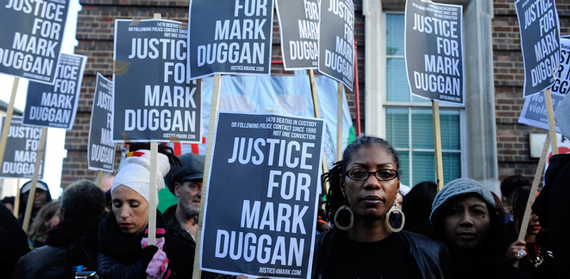Gone but not forgotten. EPA/Andy Rain
Five years ago, a wave of riots began in Tottenham, London and spread to other cities across the UK. Five people were killed, and an estimated £200m of damage was done to property.
The riots were sparked when undercover police shot dead 29-year-old Mark Duggan after a “hard stop”, a controversial tactic used by London police on organised or armed criminals to force a vehicle to stop by boxing it in with unmarked police cars.
Duggan had been suspected of being a member of the notorious Tottenham Man Dem gang. On the night he died, the police used the hard stop to corner him because they suspected him of having an illegal firearm. In the confusion after the stop, he was shot twice by a police marksman.
A hard stop was also used before the fatal shooting of Azelle Rodney in 2005, with one police witness saying it created “a set of circumstances that almost inevitably meant someone was going to get shot”.
The inquest into Duggan’s death found that, as in Rodney’s case, facts were initially misreported. In particular, it was claimed by the Independent Police Complaints Commission that Duggan had fired at the police himself, which the inquest found he did not. Many onlookers saw a common theme running through these and other cases: the consistent use of misinformation so as to legitimise police actions.
These are the issues confronted in George Amponsah’s documentary The Hard Stop, which looks into the fallout from Duggan’s death and examines the world in which he lived.
A good hiding
The film’s narrative is delivered mostly by two of Duggan’s close friends, Marcus Knox-Hooke and Kurtis Henville. The film is unflinching in its honesty in examining their past lives and how they have attempted to negotiate a life outside of crime, which Henville describes as “not a path I chose, but the path I knew” – a close parallel with the ambiguous image of Duggan that emerged after his death.
Knox-Hooke, now a devout Muslim, was sentenced to 32 months in prison, partly for leading the protests at Tottenham police station in the immediate aftermath of Duggan’s shooting. Now released, he works with young people from marginalised communities and attempts to divert them from a life of crime.
For his part, Henville searches ceaselessly for work before taking a job in Norwich, a 115-mile commute away, for ten months; later securing work as a park ranger nearer to home. Both acknowledge the difficulties in obtaining work and reflect on the material disincentives to “going straight”.
By focusing on the stories of three individuals, The Hard Stop cuts through to harsh truths about policing, accountability and justice in the UK – not least the deep lack of trust between black communities and the police in London.
In particular, the shadow of the 1985 Broadwater Farm riots, which also took place in Tottenham. Those riots were sparked by the death of Cynthia Jarrett in a botched police raid, and in turn claimed the life of PC Keith Blakelock.
The three young men at the centre of The Hard Stop grew up on the Broadwater Farm estate, and their experiences mirror those of the 1985 riots, leading one to ponder what has changed in the intervening years. In the mid-80s, residents felt a total lack of police accountability left them with no choice but to rise up against the police, and to give them what community activist Stafford Scott called “a bloody good hiding”.
These issues go back even further, to the 1981 Brixton riots, which also boiled over after years of animosity between the police and black communities, and which also spread to cities outside London. Again, the demand for greater police accountability is a thread throughout the three riots and this film. The perceived impunity with which police act is reflected in statistics that show 1,500 people have died after police contact since 1990 – of whom around 10% were non-white.
The endless cycle
When it finally delivered its verdict in 2014, the inquest into Duggan’s death determined that he was lawfully killed, despite the jury noting that he was not holding a gun when he was shot. This news was received with utter outrage and incomprehension by his family and supporters outside the Royal Courts of Justice.
Duggan’s inquest concluded a full two-and-a-half years after his death – a stark contrast to the special courts that were set up to run 24 hours a day to process the 1,500-odd people arrested during and after the riots. That gap is all the more painful given that to many onlookers, the riots looked more like an orgy of looting and destruction (an interpretation the film does not shy away from) than an uprising against injustice.
As one person in the film sees it, the way Duggan’s death was dealt with by the police and the justice system shows that “a black man’s life is worth nothing”.
The Hard Stop’s message extends to problems far beyond Tottenham, London or the UK. It has much in common with Kathleen Foster’s film Profiled, which addresses many of the same issues in New York, and recent events in Dallas, Baton Rouge and elsewhere have reminded us that this is by no means a distinctively British problem.
The US’s Black Lives Matter movement has mobilised social media to draw greater attention to the deaths of black people after police contact. Black Lives Matter chapters and protests are cropping up in the UK too, and the issue recently resurfaced in the UK with the recent death of Mzee Mohammed in Liverpool.
Amponsah’s film admirably faces the issues of policing, accountability, justice and ethnicity, but it’s still unclear how meaningful changes might occur. The conclusion, it seems, is that unless something radical changes, the cycle of violence and mistrust the film identifies looks set to continue.
Originally written for ‘the Conversation’.




Comments are disabled